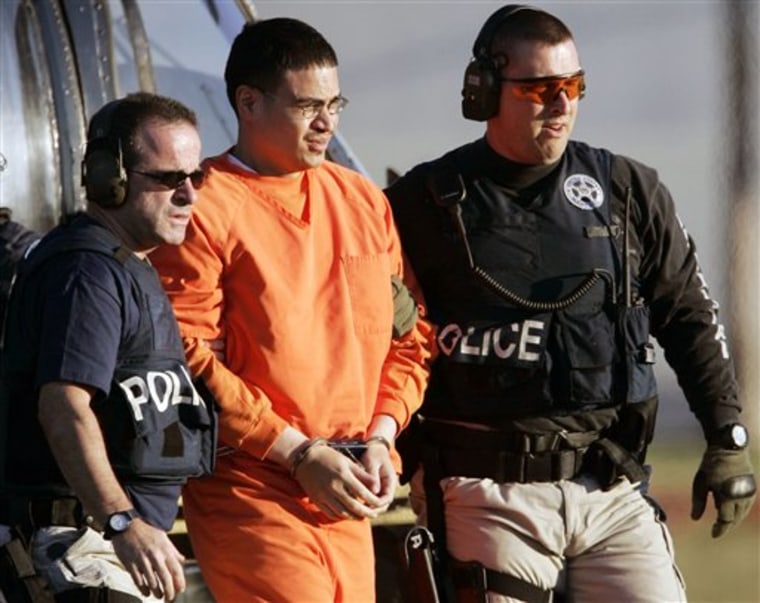Defense lawyers raised more than 90 objections Tuesday to a report recommending life in prison for Jose Padilla and two other men convicted last summer of terrorism conspiracy and other charges.
The legal battle over conclusions of a presentence report marked the opening of a lengthy sentencing hearing for the three before U.S. District Judge Marcia Cooke, who must decide whether they deserve life behind bars or more lenient sentences.
Defense lawyers say the report contains numerous inaccuracies and mischaracterizations of evidence presented during a three-month trial, leading to unduly harsh sentencing recommendations. Prosecutors countered that the objections were an attempt to undermine the jury's guilty verdicts.
"If they wanted to put on contrary evidence they had confidence in, they could have done that in front of the jury," said Assistant U.S. Attorney John Shipley. Prosecutors are seeking the maximum life sentences.
But Kenneth Swartz, attorney for defendant Adham Amin Hassoun, denied accusations the defense was trying to rerun the trial — at least, not until the verdicts are appealed to a higher court.
"We're not disputing the jury's verdict," Swartz said.
After several hours of argument, court adjourned until Wednesday. The hearing could last all week.
Convicted in August
Padilla, a 37-year-old Muslim convert who grew up in Chicago, was convicted in August along with Hassoun, 45, and 46-year-old Kifah Wael Jayyousi of being part of a North American terrorism-support cell providing money, recruits and supplies to al-Qaida and other Islamic radical groups.
Padilla has been in custody since his May 2002 arrest at Chicago's O'Hare International Airport on what authorities said at the time was an al-Qaida mission to detonate a "dirty bomb" in a major city. He was held as an enemy combatant without criminal charge for 3 1/2 years until 2005, when he was added to the existing Miami terrorism support case.
The sensational "dirty bomb" allegations were discarded before the criminal charges were brought. The FBI collected tens of thousands of telephone calls in a lengthy investigation of Hassoun and Jayyousi, but the main evidence against Padilla was a form he filled out in 2000 to attend an al-Qaida training camp in Afghanistan.
The men face life in prison because they were convicted of the most serious charge of conspiracy to murder, kidnap and maim people overseas. No specific acts of terrorism or violence were tied to them, however.
The first day of the sentencing hearing focused on Hassoun, who prosecutors said recruited Padilla at a mosque in suburban Sunrise to become a mujahedeen fighter. His lawyers raised dozens of objections about interpretation in the sentencing report of various intercepted phone calls and about descriptions of Islamic radical groups and armed conflicts around the world.
Hassoun is asking for a light sentence of no more than six years, contending that he does not deserve a life sentence based on his Muslim extremist leadership role.
Jayyousi attorney William Swor said prosecutors have not proven that his client deserves a life sentence and that evidence is being twisted to suit prosecution aims.
"It's not supported anywhere in the record. You can't sustain it," Swor said.
Jayyousi, who did fundraising and propaganda work for the group, wants a sentence of probation or no more than 21 months. Padilla's lawyers have not specified a sentence but say it should be less than 10 years.
Judge has sentencing flexibility
Cooke is not bound by the presentence report's recommendations and can impose virtually any sentence. She told defense lawyers she would not simply accept as fact all conclusions of the presentence report, much of which is based on the prosecution's case.
"Just because the government says something in its sentencing papers does not mean there's going to be the evidence to support it," the judge said.
One of Padilla's key arguments is that he deserves a lesser sentence because he was mistreated and even tortured during his long incarceration at a Navy brig in Charleston, S.C. Bush administration officials have repeatedly denied those allegations.
